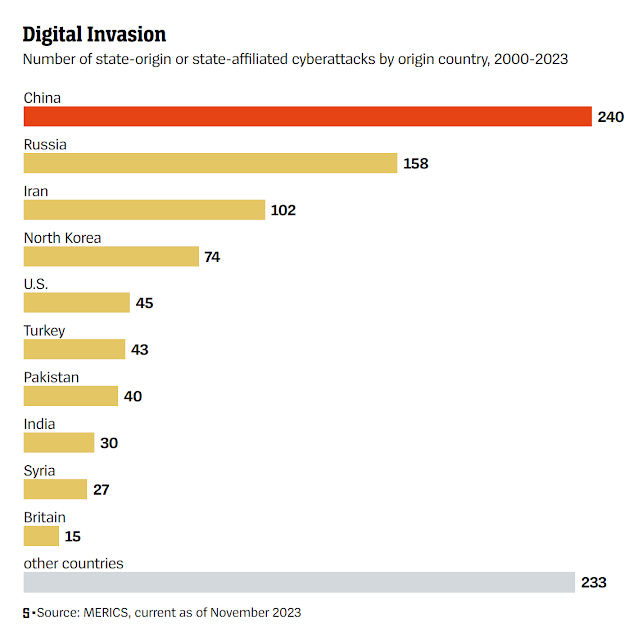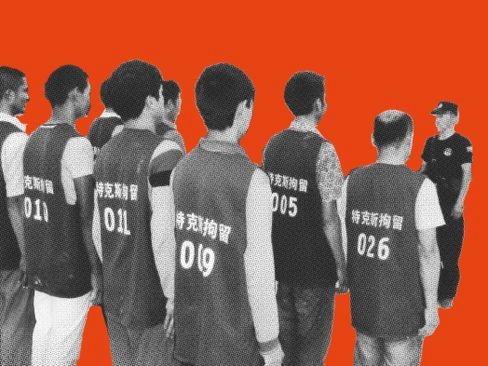Espionage from the East
"Russia Is a Storm, China Is Climate Change"
Spying from China continues to grow in both volume and sophistication. The cyber-snoops from the People's Republic have moved beyond companies and are now seeking to exert influence on politics in Germany – all while keeping a close eye on dissidents and minorities.
By Maik Baumgärtner, Cornelius Dieckmann, Georg Fahrion, Christoph Giesen, Roman Höfner, Roman Lehberger, Ann-Katrin Müller, Marcel Rosenbach, Fidelius Schmid und Wolf Wiedmann-Schmidt
German Chancellor Olaf Scholz, Chinese President Xi Jinping, indicted Chinese hackers Foto: [M] Lea Rossa / DER SPIEGEL; Fotos: Kay Niettfeld / AFP, FBI (2)
Where should we start?
Perhaps with the two pandas Meng Meng and Jiao Qing.
They couldn’t be any cuter! Chinese President Xi Jinping presented them to the Berlin Zoo six years ago, with Xi telling then-German Chancellor Angela Merkel that the bears were "ambassadors” of the good relations between their two countries.
Merkel beamed.
"Extremely likable diplomats,” she said of the pair of pandas.
Or perhaps we should go back a bit farther?
To 2014?
Xi was again in Germany, this time at the port in Duisburg with then-Vice Chancellor Sigmar Gabriel.
The two of them were eagerly awaiting the arrival of a freight train from Chongqing, which would be reaching the end of the 10,300 kilometer long "New Silk Road” in Duisburg.
Duisburg that year began referring to itself as "China City.”
A broad plan for the city called for the telecommunications giant Huawei to transform the run-down industrial metropolis in Germany’s Ruhr Valley into a state-of-the-art "smart city,” enabling the citizens of Duisburg to lead "happy and successful lives,” according to an agreement with the Chinese.
What a time.
So much hope.
So much naivete.
And now?
Duisburg has left behind its dreams of becoming a smart city.
In Berlin, Interior Minister Nancy Faeser of the center-left Social Democrats (SPD) is intent on drastically reducing China’s involvement in Germany’s mobile phone networks for fear of possible sabotage.
The German government increasingly sees the communist regime as a “systemic rival.”
Chancellor Olaf Scholz, also of the SPD, has emphasized the need for risk reduction.
And Foreign Minister Annalena Baerbock of the Green Party recently even referred to Xi as a dictator.
 German Foreign Minister Annalena Baerbock, the Chinese Embassy in Berlin [M] Lea Rossa / DER SPIEGEL; Fotos: Soeren Stache / dpa / picture alliance, Wolfgang Kumm / dpa / picture-alliance
German Foreign Minister Annalena Baerbock, the Chinese Embassy in Berlin [M] Lea Rossa / DER SPIEGEL; Fotos: Soeren Stache / dpa / picture alliance, Wolfgang Kumm / dpa / picture-allianceGerman intelligence agents have long abandoned any illusions they may once have held about the hunger for power and the increasing hostility of the Chinese Communist Party toward the West. Russian President Vladimir Putin’s war against Ukraine may be the most acute problem facing Europe at the moment.
But on the long term, the biggest threat comes from China.
"Russia is a storm,” says Thomas Haldenwang, head of the Federal Office for the Protection of the Constitution, Germany’s domestic security agency.
"China is climate change.”
Reporting by DER SPIEGEL now clearly demonstrates how Chinese spies have recruited European politicians.
Hundreds of text messages sent by a secret service agent from the Chinese Ministry of State Security, a man who goes by the name Daniel Woo, show that the communist regime commissioned parliamentary initiatives in both Belgium and Germany. Successfully.
It is an impressive success for China’s shameless activities in Europe and the country’s attempt to force its way into the heart of democracy to exert influence.
Our reporting provides a rare look behind the scenes at the powerful Chinese intelligence apparatus.
Since Xi took over power in China in 2012, he has focused intently on massively enlarging an already expansive security apparatus. Furthermore, new laws have given government agencies essentially a free hand when it comes to surveillance.
Millions of cameras have been installed in Chinese cities, an Orwellian nightmare referred to by country’s propaganda machine as Skynet.
Everything and everybody is constantly being filmed, messages in the widely-used app WeChat are analyzed and demonstrators are identified using facial recognition technology.
By 2049, the year that will mark the 100th birthday of the People’s Republic, Xi Jinping hopes to have transformed his country into a superpower – equaling, or even surpassing, the technological and military strength of the United States.
Xi refers to this project of returning his country to what he sees as its rightful place at the top of the global pecking order as the "Chinese Dream.”
And on the road to that goal, almost anything goes.
Controlling the Diaspora
The toolbox belonging to the Chinese secret service agencies is filled to overflowing.
According to Germany’s domestic security agency, the regime’s oppression of dissidents and minorities like the Uighurs is no longer limited to its own country.
Critics of Beijing living in Germany, the agency says, have also been targeted, at times by heaping pressure on their family members back home.
The goal, say German security officials, is the "control and regulation of the diaspora.”
In parallel, the German security agency says, Chinese spies are doing all they can to get their hands on future technologies, such as quantum technology, artificial intelligence, hypersonic technology and biotechnology.
Much of it also has military applications.
Company takeovers in Germany, the agency says, serve the overarching strategic goal of giving China the advantage in the global competition for knowledge.
Meanwhile, Chinese cyberattacks are no longer limited to companies and are increasingly targeting politicians, say officials.
Diplomats and agents in Chinese embassies and consulates are allegedly establishing broad networks of contacts in an attempt to secure the services of active and former German politicians.
It sounds a lot like a broad attack on Germany.
"The Chinese Communist Party,” says the German sinologist Mareike Ohlberg of the German Marshall Fund in Berlin, "is exploiting the weaknesses of democratic systems in order to undermine them.”
Chinese spies and hackers are far less obtrusive than their Russian counterparts, employing less brute force.
Yet they are at least as effective.
Poisoning critics in Britain or murdering enemies of the state in a Berlin park, as Russia’s state-sponsored killers have done, are hardly strategies that Chinese secret service agents would deploy.
Chinese hackers also stay away from splashy moves like publishing compromising emails of Western politicians in the middle of an election campaign, as Putin’s digital henchmen have done on several occasions.
Silently Penetrating Critical Systems
Cyberspies from China force their way silently into the systems they have targeted and stay put for several years, slowly and unobtrusively siphoning off sensitive information.
These long-term ingresses could also be used for destructive purposes down the road, such as to sabotage critical infrastructure, warns security expert Antonia Hmaidi in a recent study for the Mercator Institute for China Studies (MERICS), the well-respected think tank in Germany.
Dormant Chinese malware codes, she points out, have already been discovered in the U.S. electricity grid.
Numerous companies listed on Germany’s blue-chip stock index, the DAX, have been targeted by Chinese cyberattacks, such as BASF and Daimler – as has, DER SPIEGEL has learned, at least one German semiconductor producer.
In a recent survey, 730 of more than 1,000 companies surveyed say they were targeted by cyberattacks last year.
Forty-two percent have identified at least one attack originating in China.
The MERICS study notes that many of the foreign targets are consistent with the "strategic goals of China's government.”
The conclusion reached by the think tank: The cyberattacks pose "a risk to Europe’s long-term prosperity."
Even 2,500 years ago, the Chinese military strategist Sun Tzu knew how important spies are.
"If you know the enemy and know yourself, you need not fear the result of a hundred battles,” he wrote in "The Art of War.”
China’s current ruler Xi Jinping has an army of spies at his disposal.
With hundreds of thousands of fulltime agents, his secret service apparatus is "almost certainly the largest in the world,” the Intelligence and Security Committee of the British parliament has said.
That number is apparently augmented by thousands upon thousands of Chinese expatriates, guest researchers, students and businesspeople who provide their services in sending information back home – or who are forced into spying by the Chinese intelligence authorities.
A secret service law that went into effect in 2017 stipulates that "any organization or citizen shall support, assist and cooperate with state intelligence work, according to the law.”
That means that the state can require any Chinese citizen or company to cooperate with the intelligence services.
It is essentially a license for unlimited spying.
Not every student from China, of course, is a spy.
Yet state security officials in Bavaria have warned against naivete.
They are particularly concerned about the grants awarded by the state-run China Scholarship Council (CSC), which has sent around 5,000 undergrad and graduate students to Germany.
Participants must declare their allegiance to China and the Communist Party in writing, stay in regular contact with the embassy and follow any instructions they receive.
According to the head of the state security agency in Bavaria, Burkhard Körner, grant recipients must also submit regular reports.
And those reports, says Körner, are not just limited to information about their guest universities and the progress they have made with their studies.
"They can also be required to provide information about the Chinese community in exile, dissidents and minorities like the Uighurs.”
Körner recommends that universities be careful when admitting CSC grant recipients.
"The risk is real,” he says.
In the U.S., China has long been viewed as a threat, with the FBI highlighting the dangers way back in 2005.
These days, the U.S. federal police force maintains a website called "The China Threat.”
A new investigation into a case of espionage is opened by the FBI every 12 hours.
In the last two decades, Chinese agents have stolen vast amounts of data from the U.S.
The Center for Strategic and International Studies lists 224 cases between 2000 and 2023, though the number of unreported cases is likely far higher.
The Chinese siphoned off information about the space shuttle program, data about seeds from Monsanto, emails from the White House, 614 gigabytes of information about a supersonic anti-ship missile, secret company data about self-driving cars from Apple, sensitive data from millions of public servants and much more.
The thefts increasingly take place digitally.
China operates the most comprehensive hacking program of any country in the world, FBI head Christopher Wray said during a late October appearance in Silicon Valley.
It was a rather unusual occasion: For the first time ever, the secret service chiefs from all Five Eyes member states – the U.S., Canada, Britain, Australia and New Zealand – appeared before the press at the same time.
Their message: When it comes to China, the situation is more serious than ever before.
Flooding the Net with Fake News
Since then, the U.S. Department of Justice has indicted a series of suspected Chinese hackers thought to be working on behalf of the state.
On the FBI website, you can scroll through numerous "Wanted” posters with the faces of young men and women who are suspected of being behind cyber attacks on companies, government agencies and research facilities carried out on behalf of the Chinese Ministry of State Security or the Chinese military, known as the People’s Liberation Army.
The website also contains the names and photos of Chinese public servants allegedly responsible for flooding the global internet with fake news and for digitally harassing dissidents in the West.
The "naming and shaming” strategy pursued by the U.S. is supposed to act as a deterrent, but thus far seems to have had little effect.
On the contrary: Chinese cyber-groups seem to be further developing their skills and becoming more professional.
The U.S. cybersecurity company Mandiant believes that Chinese authorities are behind fully 29 groups classified as Advanced Persistent Threats (APTs), a designation experts assign to the most dangerous malicious actors on the web.
The methods they employ have also been refined: For years, Chinese cyberattackers were known for simple phishing campaigns, whereby malware is installed on computers as soon as a user clicks on a link sent by email, for example.
Today, though, Chinese groups have turned to more sophisticated methods, such as targeting weak points in servers – and they exert tremendous energy to cover their tracks.
 The German parliament building in Berlin [M] Lea Rossa / DER SPIEGEL; Foto: Paul Langrock / Agentur Zenit
The German parliament building in Berlin [M] Lea Rossa / DER SPIEGEL; Foto: Paul Langrock / Agentur ZenitGermany, too, could have realized early on that China wasn’t nearly as harmless as the pandas in the Berlin Zoo.
- "In the Bavarian town of Kolbermoor in 2009, a Chinese industrial spy’s cover was blown.
During a visit to a factory, he used a mini-camera peaking out of his pants pocket to secretly film the innovative products of a fiber-reinforced concrete specialist.
Company employees realized what he was doing and called the police.
The Chinese man was sentenced to a suspended prison sentence of one-and-a-half years.
- In 2011, a court in Munich sentenced a Chinese man for espionage activities.
A secret service officer disguised as a consulate employee had recruited him to spy on the World Uighur Congress in Munich, the functionaries of which China sees as enemies of the state.
The spy delivered the desired information to his handler during clandestine meetings in cafés, subway stations and the Nymphenburg Palace Park.
German domestic security officials managed to sniff them out.
- The University of Duisburg-Essen hosted a guest professor from China in 2008 who spent months at the institution learning about cutting edge German engineering technologies.
Only 10 years later did the university discover that the man was a major general in the People’s Liberation Army.
Back home, he heads up a military laboratory for missile tests and control technology.
- In 2021, a court convicted a German couple for espionage.
She worked as a professor with a focus on South Asia while he worked for the Hanns Seidel Foundation, which has close ties to the Christian Social Union (CSU), the center-right political party in Bavaria.
He later founded a think tank.
The two of them were recruited in 2010 in Shanghai, where they were delivering lectures.
For nine years, the couple delivered information to the Chinese secret service, either before or after state visits or multinational conferences."
Still, the danger of Chinese espionage continues to be perceived by the public as being less acute than from other powers.
Many see Russia as the primary threat, particularly after Moscow’s February 2022 invasion of Ukraine.
Michael Brand, a politician from the center-right Christian Democrats (CDU) who focuses on human rights issues, says however: "Totalitarian and aggressive China is the biggest threat of the 21st century.”
Very few Chinese in exile, who are well aware that Beijing’s reach extends into Germany, are willing to speak openly.
They are fearful that doing so could worsen the repression many of them already experience.
But Su Yutong is willing to go on the record anyway – to discuss the men in Berlin who showed up at her door wanting sex after somebody had posted a fake advertisement on the internet, for example.
Or about the police officers who suddenly visited her family in Beijing after she had attended a demonstration in Germany against the Chinese Communist Party.
And then there was the Telegram message from somebody claiming to be a Chinese civil servant, offering her tens of thousands of euros to keep silent about critical issues.
A 47-year-old journalist, Su fled to Germany in 2010 after her critical reporting and her advocacy for human rights had put her on the radar of Chinese government agencies.
Today, she writes for the U.S. medium Radio Free Asia – and has experienced pretty much all the forms of repression the Chinese handbook has on offer.
New Levels of Oppression
She has received death threats on her mobile phone and ominous booking confirmations for hotel reservations in her name that she never made.
Just recently, she told DER SPIEGEL, somebody wrote her over social media that he wanted to "blow her brains out” and kill her entire family.
It hasn’t been possible to determine with any degree of certainty who is behind the harassment, and the Chinese Embassy has denied any state involvement.
But according to experts, the dimensions and persistence of the persecution leave little doubt that it is an institutionalized campaign.
Tenzyn Zöchbauer, head of the organization Tibet Initiative Deutschland, has also experienced a number of odd occurrences.
Her family fled to Europe decades ago.
A few months ago, she met a prominent Chinese man in Berlin who is active on behalf of formerly independent Tibet.
We will call him Chen in this story for his protection.
After Chen left Berlin, he unexpectedly got in touch with Zöchbauer via Telegram to ask her for a favor.
His account had been restricted, he wrote, but she could help him unlock it by clicking on the attached link.
Zöchbauer learned that Chen had nothing to do with the message.
Somebody had hacked into his profile.
Clicking on the link would have allowed Zöchbauer’s attackers to access her Telegram account, including all of her contacts to Tibetans in exile and regime opponents.
The CDU parliamentarian Brand says that such actions are part of a "broad strategy,” adding that the harassment of dissidents "is expanding like a cancerous tumor.”
Brand is demanding that the German authorities establish a central point of contact for such instances, complete with a hotline to which victims can turn.
"It is time that Germany publicly says: Stop.”
Troublesome Experiences
The World Uighur Congress, the Tibet Initiative and the human rights organization Freedom for Hong Kong would also all like to see the creation of such a facility, as they communicated to German policymakers in a written briefing.
In the paper, the NGOs list 10 cases in which activists or their family members in China were pressured.
German security officials, the activists complain, are ill-equipped to deal with such incidents, frequently lacking sufficient linguistic knowledge or awareness of the approaches taken by Beijing.
The title of their report: "China’s Terror in Germany.”
Even the CDU politician Brand has had uncomfortable experiences.
In September 2020, he appeared on the German public television station ZDF and warned about the communists’ aggression.
In the days immediately following the appearance, his mobile phone suddenly started acting strangely.
He reported the incident to security authorities, who advised him to destroy the device.
Brand doesn’t believe it was a coincidence.
"That was an attempt to intimidate a German parliamentarian with a hacking attack.”
The network of informal overseas "police stations ” maintained by China in more than 50 countries in the world – including Germany – shows just how far the People’s Republic is willing to go. Reports from an NGO brought the network to light in 2022.
According to the Chinese, the facilities were merely established to assist Chinese expatriates with bureaucratic necessities.
But German security officials have warned that they could be used for "spying on and influencing the Chinese diaspora.”
A handful of businesspeople were listed on Chinese websites as the contact points for such "police stations.”
One of them is a man who has operated a Chinese restaurant in the Mitte district of Berlin for many years.
He reacted to a recent call with annoyance: "You’re bothering me.
I have no time for you.”
The man responsible for an alleged "police station” near Munich says over the phone that the whole thing was a huge misunderstanding.
He says he had only wanted to help Chinese living in Bavaria extend their driver’s licenses during the pandemic, since it was impossible for people to travel back home to take care of such issues.
Regarding spying or repression, he says: "How would I have time for that?
I work day and night.
Do you think I opened a restaurant to spy on my guests or my compatriots?”
Thus far, the Chinese overseas "police stations” have not led to any indictments in Germany.
In the U.S., though, the FBI arrested two men who are thought to have secretly collected information about a human rights activist with Chinese roots.
They operate their "overseas police station” out of an office building on East Broadway.
Right in the heart of New York City.




0 comments:
Publicar un comentario